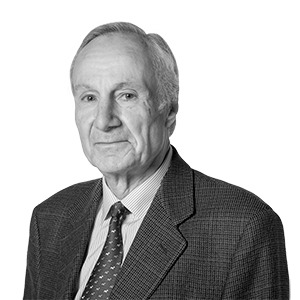

We are experiencing a period of great disorientation in most of our societies, and this situation is jeopardizing the relative peace and progress that characterized the second half of the 20th century. We are experiencing this quite acutely, both here and around the world, and therefore there is no need to explain it again. But it is urgent to analyze its causes and take the necessary measures to avoid a truly disastrous crisis for the people who live and will live in the coming years. We have seen and will see books on this subject, but I will limit myself now to a specific perspective, as reflected in the title of this article.
1. The welfare state as a cause. There is no doubt that, along with many other factors (technological, climatic, political, social, etc.), the gradual introduction of what we have termed the "welfare state" was the main reason for the significant progress experienced. We can summarize it in a few words: states, democracy, economic growth, reduction of inequalities and increase with distribution of personal and collective well-beingWe look at what's been happening lately with some of these words and how to revise them for the future.
2. The future role of states. Throughout the 20th century, states, both small and large, have played a fundamental role in the functioning of global politics and economics, both in organizing the coexistence of their citizens and in participating in geopolitics. The existence of a few large states (some democratic, others authoritarian or dictatorial) has complicated matters for smaller states and led to the creation of supranational organizations of an economic or political nature (EU, NATO, etc.), which are now beginning to prove less effective. I have the impression that the role of what we now call the "state" will change in the future, that their number will decrease significantly, and that they will be organized with a highly "federal" character, allowing for great internal pluralism—cultural and linguistic—along with strong centralization in economic, political, and defense terms. Furthermore, international organizations of a UN-like nature with global regulatory power will need to be reformed or created. We should start thinking about how to implement this crucial change, one that puts in place mechanisms to allow for the coexistence of eight to ten billion people on the planet.
3. Growth and well-being. Today, "growth" is constantly sought after and touted, understood as the growth of GDP or economic activity. This is positive, but it cannot be the primary objective of political management without also addressing GDP per capita, reducing inequality, and, ultimately, achieving greater personal well-being. This requires economic components but also demands elements related to social interaction, culture, and tranquility that contribute to overall well-being. The financial mechanisms of the welfare state should be reviewed, both in terms of revenue distribution and the allocation of public resources across various applications. The universality of education, healthcare, and social assistance cannot be extended to other aspects of life, with their specific characteristics and limitations. Examples include housing and certain aspects of personal development that cannot be addressed in current schools.
4. Democratic politics. We must prevent the continued occurrence of political decisions being heavily centralized in a minority group, even in formally democratic states, that controls some of the fundamental resources for collective life (natural resources, financial resources, technological knowledge, information, personal data, etc.). This control can take the form of direct or disguised participation in decision-making processes, or the manipulation of information that allows for decisive influence on the results of citizens' seemingly free votes. In recent decades, we have witnessed a shift from control through financial power to control through power related to new technologies and the manipulation of data and information. Furthermore, we have seen how these two powers have combined and controlled...
In the developed world, it is essential that political activity be viewed as the management of citizens' well-being, not as an activity rife with infighting, lies, and even personal attacks; and that it be understood that defending different and even contradictory ideas can be very positive if it allows for the pursuit of agreements and joint action. The current situation in many European countries makes it highly unlikely that we will see any improvement in well-being.
Finally, the developed world must make an effort to ensure that the many remaining autocratic states receive the pressure, and above all the support, to adopt democratic constitutions. If they want to and can look to Europe, they will have to look to the Europe of half a century ago rather than to the Europe of today.
